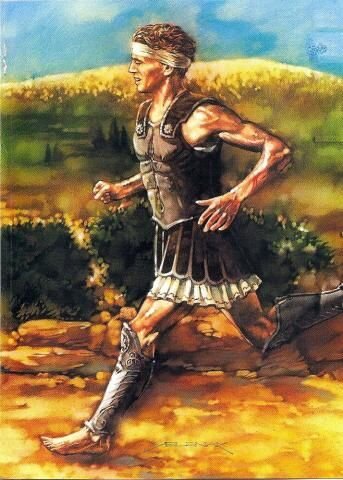The Myth of Marathon
The Marathon is probably the most widespread sport event in the world. Most countries have at least one organized every year, like the New York Marathon or the Berlin Marathon, to name a few. A Marathon was first held during the re-inauguration of the Olympic games in 1896, and a Greek won. Marathons have a famous legend tied to them, and let's look at it further.
The semi-mythical story states that during the first Greek-Persian war in 490 BC, the army of Athens crushed the Persians due to a Marathon. With the threats of the Persian fleet being very present, a soldier ran 42km or so back to Athene to tell the people not to surrender as their army was still standing. The runner eventually died of exhaustion on the spot of his arrival. Soon after, Hoplites, on the Athenian's side, arrived to threaten the Persians, who then retreated.
Who was this runner? And is this story even real?
First of all, the most well-known identity of the mysterious runner is Pheidippides, who was a messenger of the Athenian army. However, there is minimal source supporting this. Also, it is highly debatable that a dedicated messenger, accustomed to long distances (by foot) died of exhaustion due to running a distance that a trained human can achieve today, even considering the heat to which he was very much used to.
Indeed, he wasn't exactly a random peasant conscripted into service. He was described as a Hemerodrome (professional-running courier). Also, he didn't take part in the actual battle itself, not being a soldier, meaning that he was fresh and lightly equipped, ready for the race. Keep in mind that 42 km is the current distance used for a full marathon, being the distance that separated Athens from Marathon. This would have been within reach of a trained runner of the time unless he was awfully bad at his job.
Another, more believable story also comes from the same time range. This time, the runner is named Eukles, and even if he ran the same distance, his situation differs significantly from Pheidippides. The most crucial difference is that he wasn't a Hemerodrome but a Hoplite, a heavy infantry unit of the Greek world. Even if Hoplites were generally fit and well trained, long-distance running wasn't as much part of their skillset as it was for a dedicated Hemerodrome. Also, Eukles did the running with his full gear, which weighs about a third of the average Greek Hoplite total weight. On top of everything, he also took part in the battle of Marathon, something that Pheidippides did not.
The battle wasn't exactly small either; it was a five-day-long brutal clash between Athene and Persia. So, to say that Eukles wasn't exactly in his best condition would be an understatement. With all this considered, him dying of exhaustion after a five-day battle and 42 km run in a full set of armour is far more realistic than a light, fresh runner simply dying from the race alone.
Of course, nothing concrete proves that either of those stories are true, and there are dozen more existing as well, but I chose to tell you the two most famous ones. So, if anything, maybe this is a work of fiction written by historians long after the events to romanticize the whole story.
